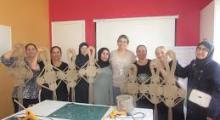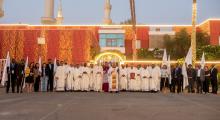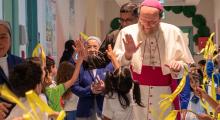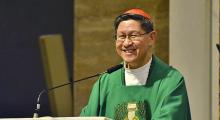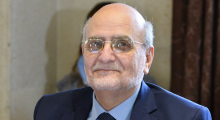Issued by the Catholic Center for Studies and Media - Jordan. Editor-in-chief Fr. Rif'at Bader - موقع أبونا abouna.org
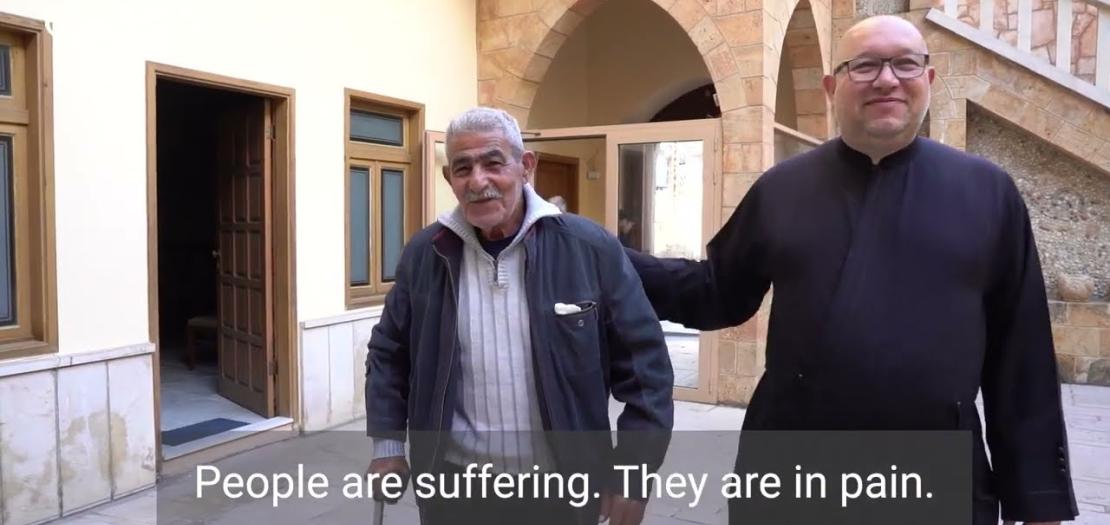
Reverend Fr. Marios Khairallah barrels along a road that leads to the mountain villages of southern Lebanon, overtaking as many vehicles as he can.
“I am scared that an Israeli drone will strike now, if one of their targets is on this road,” he says.
The priest of the Melkite Greek Catholic Archeparchy of Tyre, the main coastal city of southern Lebanon, is anxious.
“Who knows who is in this car, or what this truck is carrying?” he says, pointing at the vehicles ahead.
Southern Lebanon once again became a theater of war on 8 October, when Hezbollah, a Lebanese political party and Shiite militia, launched air attacks on Israel in support of Hamas, after Israel began bombing Gaza in retaliation for Hamas’s terrorist attacks on Israel a day earlier.
Exchange of fire has ensued between Israel and Hezbollah almost daily since, threatening the lives and livelihoods of inhabitants in southern Lebanon and northern Israel. By mid-April, the cross-border fighting had displaced tens of thousands and killed more than 70 civilians, including three journalists, in southern Lebanon and eight civilians in northern Israel.
This war is not the first for Father Khairallah. He was born in 1975 in Tyre, a few months into a civil war that would last 15 years.
Then, in July 2006, during a 34-day conflict between Hezbollah and Israel, Father Khairallah took charge of coordinating aid for the south. “I helped rebuild the Christian villages,” he recalls.
Father Khairallah arrives at the mountain village of Derdghaiya and parks in front of a house. He and staff of the regional office of CNEWA-Pontifical Mission in Beirut step out of his car and are greeted by Matta Elia and his wife, Doha Hassan Chalhoub, along with several puppies, a horse and two cows. The couple welcomes the guests inside and serves them traditional Lebanese yogurt, called “laban.”
Mr. Elia and his wife began producing dairy products five years ago, when Lebanon was hit by an economic crisis the World Bank has ranked among the top 10 economic crises worldwide since the mid-19th century.
The crisis plunged 82 percent of Lebanon’s population into poverty, doubling the poverty rate between 2019 and 2021, according to a report by the United Nations Economic and Social Commission for Western Asia. The report measured poverty in Lebanon across six dimensions: education, health, public utilities, housing, assets and property, and employment and income.
Mr. Elia, a chief warrant police officer, recalls how “life was comfortable” before the crisis, that is, before his salary plummeted with the devaluation of the Lebanese pound against the U.S. dollar. When his monthly income dropped to $150, the couple became more resourceful. They bought two cows, and his wife, a Shiite Muslim, began selling milk and homemade yogurt to local Christians and Beirutis who spent weekends in the south.
However, the stream of customers dried up with the current conflict, as many inhabitants fled their homes and weekend travel to the region stopped, causing the family to descend from financial precarity into outright poverty.
“Before the war, we did not need help,” says Mr. Elia, a Melkite Greek Catholic, as Father Khairallah carries in a parcel of staple foods: lentils, rice, cooking oil, sugar and “halawa,” a sweet treat made with sesame seed paste.
When Anna, their youngest daughter, is out of sight, Mrs. Hassan Chalhoub starts to cry. “We cannot do anything anymore,” she says. “People have to give us money.”
The family of six received a food parcel from CNEWA in October, then a $50 voucher for a local supermarket in December. To date, CNEWA has distributed vouchers to 2,710 families in southern Lebanon affected by the war, totaling $175,225 of food relief.
On that day, Father Khairallah brought additional good news: CNEWA would cover a portion of their eldest daughter’s $680 annual tuition at the local Catholic school. In Lebanon, public education is chronically underfunded, causing class interruptions and school closures. Therefore, many parents send their children to private or Catholic schools. However, many families have not been able to pay tuition since the school year began.
In response, CNEWA distributed $130,000 among seven schools affected by the conflict to assist with tuition shortfalls and teacher salaries.
From her living room, Mrs. Hassan Chalhoub gazes southward, in the direction of the disputed border with Israel, some 22 miles away. The demarcation line, also called the Blue Line, has been enforced by U.N. peacekeepers since 2000, when Israel pulled out of southern Lebanon after 15 years of occupation.
At night, she says she sees white phosphorus — a toxic chemical that causes deep burns and pollutes water and soil — being dropped from the sky. Some human rights groups have alleged the use of white phosphorous by the Israel Defense Forces in southern Lebanon, as has Hadi Hachem, the chargé d’affaires ad interim of the permanent mission of Lebanon at the United Nations.
“But, even if we die,” says Mrs. Hassan Chalhoub, “we will stay here.”
Jamil Salloum fled his village, Yaroun, located less than a mile from the Blue Line.
“The bombing started on 8 October. On the following day, we left with nothing,” he recalls.
Mr. Salloum and his sister first sought refuge with their niece in a nearby village. Then they all moved together to Tyre, 15 miles from the demarcation line. As of mid-April, 92,621 southern Lebanese were internally displaced, according to the International Organization for Migration; Tyre was hosting 28 percent of them.
Mr. Salloum talks little, admitting it is painful to be financially dependent on his niece and her husband, with whom he relocated to a flat, along with their children and his sister.
“I work in a tobacco plantation and in greenhouses. In Tyre I cannot work: the agricultural lands are up there,” he says, referring to Yaroun. “The Israelis dropped white phosphorus,” he alleges, “so when we return, we will need to heal the land, as we have to heal the people.”
“But, even if we die, we will stay here.”
Visibly moved, he scrolls on his phone to find photos of what is left of his house. Struck twice by the Israeli army, his house is now destroyed. The photos show shattered windows and smoldering ruins of his belongings.
“Life is hard. I speak on behalf of all the country, not just me, not just the south,” he says. “If we want to go back [to our villages], we will need support. Nobody helps us.”
Mr. Salloum has a point. Fragile, corrupt and bankrupt, the Lebanese state has been unable, for decades, to provide citizens with a safety net.
Since the economic crisis started in 2019, the population has been reliant on remittances from the diaspora to survive, as well as on aid from international humanitarian, political and religious organizations.
For many in Tyre, the last safety net has been the Melkite Greek Catholic archeparchy, where Father Khairallah coordinates social assistance.
Fahed Elias Assaf was a fisherman until 2006, when his weakened health forced him to retire. Since then, life has been difficult. He, his wife and their children live in very precarious conditions.
The family had fled to Beirut and returned to Tyre three times since October. While at the end of March the city center was still spared by the Israeli army, the buzzing of drones was relentless.
In their home in Tyre, a small front room with a leaky wooden ceiling hardly accommodates two beds and a fridge. A large TV screen hangs on the wall. An adjacent room becomes a bedroom at night. Mr. Assaf’s family benefited from a $50 food voucher in December.
The Lebanese state provides the population with only a few hours of electricity per day. To access electricity otherwise, citizens must pay a subscription for a generator — an expense that represents 88 percent of the monthly income of the poorest 20 percent of Lebanese households, according to Human Rights Watch.
Mr. Assaf says when his children, also fishermen, “have enough money, they pay for the generator.”
Additionally, Lebanon’s National Social Security Fund and Ministry of Public Health used to cover health care for a share of the population, but this government system has de facto ceased to function since the onset of the crisis.
Since 2022, therefore, Father Khairallah has been coordinating health care funded by the archeparchy for 60 families, whose members suffer from chronic illnesses. Mr. Assaf, who suffers from high blood pressure and diabetes, is among those whose medical visits and medicines are covered by the archeparchy.
Father Khairallah says the role of the church is not to replace the state but to preach the Gospel and give the sacraments. However, he admits he finds joy in being “by the parishioners’ side during this difficult time.”
“We must trust God and Jesus Christ. This is what gives us hope.”
When his phone rings, the priest picks up immediately: An airstrike targeted a village 18 miles east of Tyre.
“Was it close to the church?” he asks. “I will call the priest, and make sure he is all right.”
In the village of Qana, the scars of wartime are being passed on to a new generation. Slouching back on a couch, 14-year-old Mirella Boutros looks up from her smartphone and shares a photo of a broken window of her home, a 20-minute drive from Tyre.
“We hear the fighter jets a lot, so I cannot focus much,” says Mirella about the situation at her school, located close to villages that are bombed regularly.
“When there is an attack, some students lose consciousness, others shout. In the bathrooms, if [the Israelis] strike one more time, the walls will collapse. The windows are already shattered,” she says.
As the day draws to a close, Ziad Boutros, her father, says: “Wait a bit later, and [the bombing] will start. It happens every day.”
“We are waiting for the situation to get better,” he says. “Neither the Muslims nor the Christians can do anything.”
Qana is home to 53 Christian families, but most people in the village are Shiites. Mr. Boutros says communities live together serenely.
“The needs are immense, and we cannot address them.”
“We talk about social issues, not politics. Politics and weapons are not our problem,” he says. “We are all children of the country.”
The police officer has just become a father for the fifth time. Before the crisis, the birth of his son Charbel would not have drained his finances: His monthly salary was $2,000. It is now $200, the price of the C-section his wife underwent.
Father Khairallah says diapers and infant formula are out of reach for many families. “One container can cost up to $8,” he says.
The priest is preparing a list of 30 families whose babies will receive formula for a few months, thanks to a $4,000 grant from CNEWA.
“We may not have a lot of money, but we work to the best of our ability with wisdom.”
Metropolitan Archbishop Georges Iskandar of Tyre says the archeparchy has tried to respond to the distress of his flock since the onset of the war and to support their ongoing presence in their villages.
“The needs are immense, and we cannot address them,” he says.
“We are in contact with religious leaders of other groups, and we asked [Hezbollah, Hamas, Palestine Islamic Jihad and Amal] to avoid taking actions too close to the houses,” he says.
Almost six months into the war, the archbishop says one must have “the same faith the Canaanite woman” in the Gospel of Matthew had when she asked Jesus to cure her daughter in Tyre.
“God helped us, God is helping us and will help us to avoid [all-out] war.”


